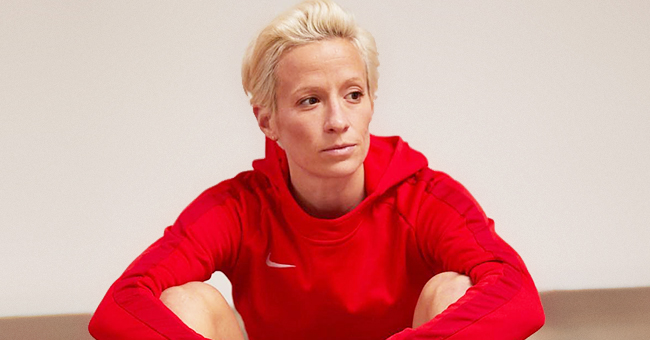
Megan Rapinoe's Elder Brother Brian's Struggle with Drugs and Gang Life While in Prison
When the US female soccer team won the 2019 Women’s World Cup, Megan Rapinoe gave a birthday shout-out to Brian; her brother who turned his life around.
"Just one thing: Happy birthday, Brian. I love you so much," Megan said. Her brother couldn’t attend the game in France since the San Diego’s Male Community Reentry Program he is part of, didn’t allow him to leave the US. Although Brian had been clean for 18 months, his troubles with drugs began when they were children.
Five years Megan’s senior, Brian, was the one who taught them soccer and how to catch crawfish in the creek. As the charismatic jokester among the six siblings, he made everyone laugh. He set cones up in the yard and taught the then-4-year-old Megan and her twin sister, Rachael to dribble a ball.
"And it wasn't like he drilled them. He let them do it their own way," their mother, Denise Rapinoe, said. "It was just the cutest thing, and we remember it so clearly."
At the age of 12, Brian started smoking marijuana and admitted that he got hooked “right from the start.” The “fast life” of driving beautiful cars and getting high attracted Brian, but it led to his arrest and juvenile detention three years later when he took meth to school.
By the time Brian turned 18, his drug of choice had become heroin, but he had also branched into other law-breaking behavior. He got charged with evading arrest, car theft, and a hit-and-run.
Since the law now regarded him as an adult, juvenile detention fell away, and he went to prison. Within months Brian aligned himself with a white supremacy prison gang and got the tattoos to match. His actions devastated the family as Denise said, "The prejudice, the racism -- it was so against the way he'd been raised. He wasn't that kind of kid. He was kind; his nature was so loving."
Brian saw his alignment with the gang as survival but also as a way to support his heroin addiction. While part of prison gang life he racked up various charges that included three assaults, possession of a deadly weapon and drugs.
At 27-years-old, Brian got transferred to Pelican Bay State Prison in Northern California, where are perceptions about people started to change. Solitary confinement is not segregated and the only people he had contact with, are those he saw during his daily hour-long walks in the pod.
"You start relating to people beyond your hood, your area, your color. It doesn't take long before you start talking with each other, seeing how much you have in common. Back there, it's just you in the cell, and the man next to you is just a man himself," Brian said.
For two years, Brian served on the same pod as the black nationalist and author of “Monster: Autobiography of an LA Gang Member,” Monster, also known as Sanyika Shakur. Brian read a lot of books about social issues and learned more about racial discrimination and how it works.
"He taught me what it means to be racist, and he taught me what it means not to be racist," he added. By 2010, and with a new understanding into the workings of white supremacy, Brian had the tattoos on his face lasered off. He changed the swastika on his palm to a spider while the Nazi lighting bolts turned into skulls.
However, the then-30-year-old still used heroin, and shortly after his release from prison, Brian went back; this time to Donovan State Prison in San Diego.
When sister Megan made headlines in September 2016 for kneeling during the national anthem before a soccer match in protest against police brutality and racial profiling, Brian got to see it from outside prison.
Still nursing his heroin addiction, Brian landed back at Pelican Bay by July 2017. But when a cellmate tried to help him inject heroin into the back of his neck one day, the needle broke, and his breakthrough came. "I freaked out on him, really lost it, and he said to me, 'Look at how you are acting right now,'" Brian recalled.
His cellmate’s words hit deep, and Brian found himself wondering why his happiness depended on a hypodermic needle. He decided to turn his life around and enrolled in the prison’s rehabilitation and self-improvement classes.
"If I do drugs," he said. "I will go back to prison. I didn't believe that for a long time. Now, I believe that -- I don't ever want to go back."
His sister Megan had become his role model, and Brian hopes to make a positive difference in the future. "I want to make a difference," he said. "I want to be like Megan."
The family is proud of how he had changed his life around as Megan added, "He has so much to offer. It would be such a shame if he left this world with nothing but prison sentences behind him. To be able to have him out, and to play for him, and to have him healthy, with this different perspective that he has now: This is like the best thing ever."
As the youngest of six siblings by eleven minutes, Megan not only made her family proud at the 2019 Women’s World Cup in France, but also the entire United States.
She became the Golden Boot winner for the tournament's top goal scorer and also won the Golden Ball award as the tournament’s top player.
While Megan continues to make headlines for her talent and outspoken nature, her twin, Rachael is doing the same as she passionately advocates for equality.
